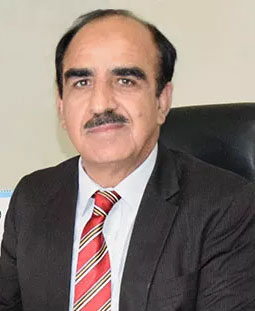Prof. Dr. Atta Ullah Shah
The Indus River basin supplies freshwater and other ecosystem services to sustain at least 226 million people in Afghanistan, China, India, and Pakistan. However, population growth and climate variability are placing increased stress on these vital resources, raising concerns about food, energy, and water security. To address these pressing issues through regional collaboration, the 4thIndus Basin Knowledge Forum (IBKF) was established as a common platform for scientists, policymakers, and specialists working on the Indus basin region.
The fourth IBKF was held on 23–24 August 2019 at the International Centre for Integrated Mountain Development (ICIMOD) in Kathmandu, Nepal, focusing on the theme” Pathways to impactful research”. The forum included three sub-themes: a) policy-driven impactful research, b) engagement and inclusiveness, and c) packaging of research. The forum brought together 80 participants from ICIMOD’s regional member countries, including government representatives, stakeholders, academics, and donor organizations. Despite the wide array of research being conducted on the Indus basin, the integration of research findings into policymaking has been inadequate. Accordingly, theforum aimed to convey relevant and beneficial research outcomes to related stakeholders and organizations, including gender and social inclusion in the policy-making process. Another primary objective was to explore major concerns and challenges related to future research on the basin.
In his inaugural speech, David Molden, Director General, ICIMOD, shared details of the forum’s objectives and targets and shone light on the adverse impacts of climate variability and changes in the monsoon system over the region. He emphasized on the importance of developing strong linkages with planning institutions and identifying inclusive and participatory solutions through research.
Harber Olart, representative of the International Institute for Applied Systems Analysis (IIASA), highlighted the crucial role of informative research in tackling environmental problems. Olart also reflected on the development of 10 working groups – discussed during the previous three forums – to tackle the gap between the need and delivery of research. Peter Budd, Australian Ambassador to Nepal, spoke about the importance of policy-driven impactful research and encouraged extensive dissemination of research outcomes to society through different communication media.
Impactful research and disseminating outcomes to society
Research adds to existing body of knowledge and proposes durable and cost effective solutions to various problems faced by society. If most research papers are shelved in libraries, society cannot benefit from their findings. Therefore, it is important for research organizations to develop close linkages with society and government institutions, and for policy- or law-making processes at national, district, and local levels to integrate perspectives and findings from educational and research institutions.
The fourth IBKF identified the following hurdles regarding policy-driven impactful research:
• Educational and research institutions are more oriented towards merely publishing their research in scientific journals, rather than actually directing research focus on social issues and creating social impact.
For research outcomes to be used to develop sustainable solutions forsocial issues, the research impact should also be considered. Currently, research in developing countries and IBKF related nations, is aimed towards publication in high impact factor journals rather than for the benefit of society.
Mistrust between policymakers and research institutions leads to poor integration ofresearch outcomes during the policy-making process.
Research and development cellsare required in government bodies to ensure close coordination between government and research institutions and facilitate conversion of research into action.
Research needs should be promoted and research outcomes need to be disseminated at the national, provincial, and local levels.
Engagement and inclusiveness
The forum deliberated on developing strategies for gender and social inclusion in the research process as per Sustainable Development Goal(SDG). This can be aided by striving to achieve SDG 17, which focuses on global partnerships and close linkages to strengthen the means of implementation. To achieve the SDGs by 2030, holistic and impactful partnershipsamong government, society, private sector, academia, and research institutions are crucial. Individual efforts fall short without effective partnerships. In Pakistan, public–private partnerships are being promoted to bring actionable solutions for the betterment of society. The IBKF countries needs to integrate the earlier research database in various thematic issues related to Indus Basin Challenges and share it with the relevant stakeholders for promoting inclusiveness.
Packaging of research
A diverse research on various important challenges to Indus Basin exists but for effective implementation, it needs to be packaged under major themes and needs of the region. The forum also covered components of research packaging and communication of new research to decision makers. This is important since research should cover actionable topics through impactful ways. In sum, the fourth IBKF reflected on the diverse research conducted in the region, and the participants were keenly aware of the work ahead in integrating research outcomes in policy making. Through focused group discussion and deliberations, more ideas were explored by the participants of 4th IBKF.
The importance of Indus Basin, for the socioeconomic development and sustainable ecosystem of the region, demands that the research on various thematic areas and challenges must be translated into action, to save it from further deterioration.
—The author is Vice-Chancellor, Karakoram International University.










